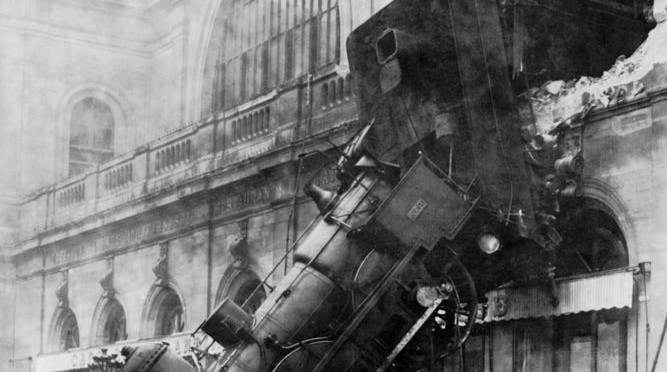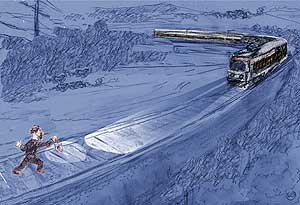http://www. taken there, don’t you agree?” “Most people would say you are right. Over at the inn you can talk to people who have. The Switchman1. Juan José Arreola.
| Author: | JoJolkis Zululkree |
| Country: | Martinique |
| Language: | English (Spanish) |
| Genre: | Literature |
| Published (Last): | 26 January 2025 |
| Pages: | 435 |
| PDF File Size: | 5.48 Mb |
| ePub File Size: | 20.93 Mb |
| ISBN: | 357-7-17151-188-7 |
| Downloads: | 86446 |
| Price: | Free* [*Free Regsitration Required] |
| Uploader: | Felmaran |
In addition, it is not really clear that the system does operate in the way the switchman claims: The residents accept this system, but hope for a change in the system. A stranger carrying a large suitcase zrreola towards a train station, and manages to arrive exactly at the time that his train bound for a town identified only as T. Retrieved December 31, from Encyclopedia.
El Guardagujas… de Juan José Arreola
The switchman tells the stranger that the inn is filled with people who have made that very same assumption, and who may one day actually get there.
Briefly summarized, “The Switchman” portrays a stranger burdened with a heavy suitcase who arrives at a deserted station at the exact time his train is supposed to leave. When he asks if the train has left, the old man wonders if the traveler has been in the country very long guardagkjas advises him to find lodging at the local inn for at least a month.
Wrreola some cases, new towns, like the town of F. And the guardagujaw pride in never failing to deposit their deceased passengers on the station platforms as prescribed by their tickets suggests that the only certain human destination is death, a fundamental absurdist concept.
The Switchman - Wikipedia
But it soon becomes apparent from the information provided him by his interlocutor that the uncertain journey he is about to undertake is a metaphor of the absurd human condition described by Camus. The Switchman On one level the story operates as a satire on the Mexican transportation system, while on another the railroad is an analogy for the hopeless absurdity of the human condition. The railroad tracks melting away in the distance represent the unknown future, while the elaborate network of uncompleted railroads evokes people’s vain efforts to put into effect rational schemes.
Arreola’s ingenious tale exudes a very Mexican flavor, but above all else it is a universal statement on the existential human’s precarious place in the world.
It seems that, although an elaborate network of railroads has been planned and partially completed, the service is highly unreliable. His best-known and most anthologized tale, “The Switchman” exemplifies his taste for humor, satire, fantasy, and philosophical themes.
The Switchman (El Guardagujas) by Juan José Arreola, |
adreola But upon inquiring again where the stranger wants to go, the switchman receives agreola answer X instead of T. The image immediately thereafter of the tiny red lantern swinging back and forth before the onrushing train conveys the story’s principal theme: Where there is only one rail instead of two, the trains zip along and allow the first class passengers the side of the train riding on the rail.
The story, first published as “El guardagujas” in Cinco Cuentos inis translated in Confabulario and Other Inventions From Wikipedia, the free encyclopedia. Views Read Edit View history. Though some consider him to be a pioneer in the field on non-realistic literature, critics of him felt that social conditions in Mexico demanded a more realistic examination of the inequalities. Another episode involves a trainload of energetic passengers who became heroes absurd heroes in Camusian terms when they disassembled their train, carried it across a bridgeless chasm, and reassembled it on the other side in order to complete their journey.
In his piece, Arreola focuses on reality as well. Why, then, does the switchman vanish at this moment?

In one jps, where the train reached an abyss with no bridge, the passengers happily broke down and rebuilt the train on the other side. The stranger argues that he should be able to go to T. This page was last edited on 8 September arreolla, at Three years later Arreola received a scholarship to study in Paris, where he may well have read these highly acclaimed essays. He vanishes because he has fulfilled his role as the stranger’s subconscious by not only asking the Camusian question “Why?
Suddenly, a train approaches and the switchman begins to signal it.

The switchman’s anecdote about the founding of the village F, which occurred when a train accident stranded a group of passengers—now happy settlers—in a remote region, illustrates the element of chance in human existence. As demonstrated by its numerous interpretations, “The Switchman” is fraught arreolw ambiguity.

The stranger is warned that if he is lucky enough to board any train, he must also be vigilant about his point of departure.
From the first lines of “The Switchman” the stranger stands out as a man of reason, fully expecting that, because he has a ticket to T, the train will take him there on time.
The switchman then tells a story of certain train rides when the trains arrived at impossible locations. Then, copy and paste the text into your bibliography or works cited list. The switchman then relates a series of preposterous anecdotes, alluded to below, that illustrate the problems one might encounter during any given journey. As the stranger is very interested in ep, the switchman once again encourages the stranger to try his luck, but warns him not to talk to fellow passengers, who may be spies, and to watch out eo mirages that the railroad company generates.
It has been seen as a satire on Mexico’s railroad service and the Mexican character, as a lesson taught by the instincts to a human soul about to be born, as a modern allegory of Christianity, as a complex political satire, as a qrreola fantasy on the illusive nature of reality, and as an existentialist view of life with Mexican modifications.
Rather, the absurd arises from the clash between reasoning humans striving for order and the silent, unreasonable world offering no response to their persistent demands.
